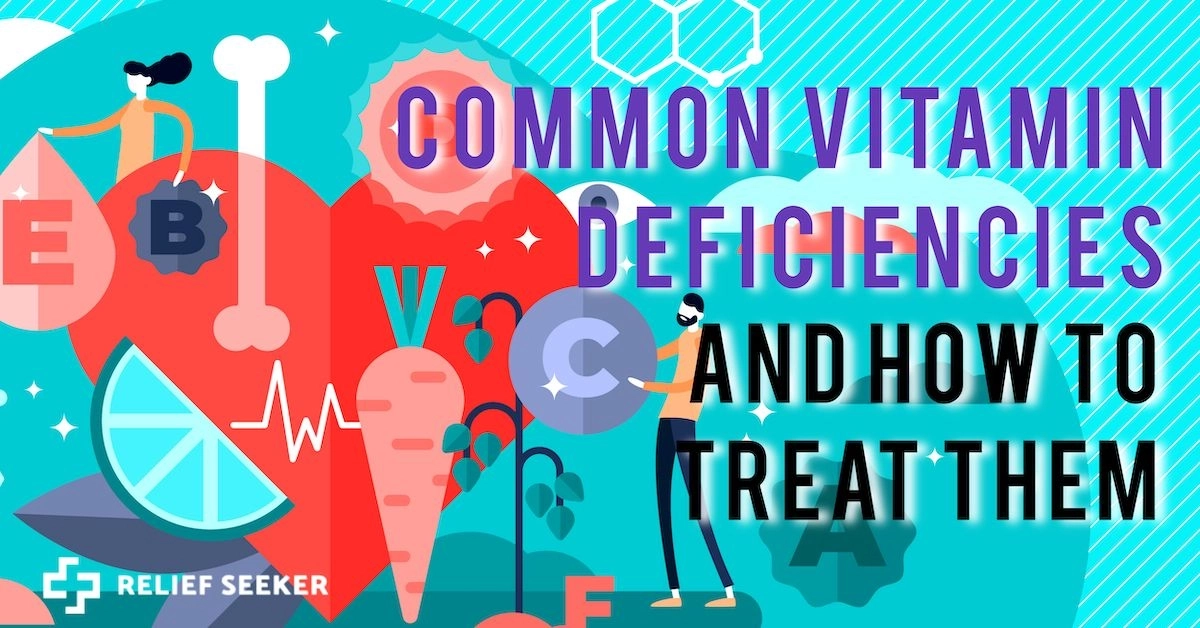Let’s start by asking the question, ‘Are you getting the vitamins you need from your daily food intake?’ If the answer is no or I’m not sure, we’ve got your back. In the following article, we’ll take you through the most common vitamin deficiencies and what you can do to treat your vitamin deficiency.
The Basics of Vitamins and Minerals
Vitamins and minerals are super important nutrients that your body needs to perform at its very best. They play many critical roles in the body, from regulating your thyroid, to how much sugar needs to be metabolized to maintain an even energy level to get you through the day. While eating a healthy and balanced diet is still the best way for your body to take in a sufficient amount of the vitamins and minerals you need, the average person is still low in a little over a handful of those necessary nutrients.
According to the Centers for Disease Control and Prevention (CDC), 10% of American adults aren’t getting the nutrients they need and therefore suffer from a vitamin deficiency, and failing to get the proper amount of nutrients can lead to fatigue, skin issues, and the development of many diseases.
A few examples of diseases that can result from vitamin deficiencies include:
Anemia - This is caused by a lack of iron in the blood, which can cause a person to become tired very quickly, thin your blood, and make you bleed more easily.
Osteoporosis - This is caused by a lack of Vitamin D and is a disease in which the bones lose mass, become brittle, and cause them to break easily.
Scurvy - You might be laughing at this one because we all associate this disease with old-timey sailors or pirates. Still, when a person lacks enough Vitamin C, scurvy can rear its ugly head, causing the gums to bleed and a person to be overly lethargic (tired).
Vitamins Vs. Minerals
To best understand what you’re lacking, it’s essential to know the difference between vitamins and minerals; yes, they’re both crucial to your health, but we get them in different types of foods, and they’re broken down in different ways.
Vitamins are organic and can be broken down by air, heat, or acid, whereas minerals are inorganic, which gives them the ability to hang tight to their chemical structure. For example, the minerals you would ingest if you ate a piece of fish (fish oil, Omega-3) are harder for the body to breakdown, making them stick around longer. Or, if you over-cooked a leafy green, like kale, which is rich in Vitamin D might not make it into your bloodstream because the vitamin was exhausted by the heat and air during the cooking process.
Major minerals include:
Calcium
Chloride
Iron
Magnesium
Potassium
Sodium
Major Vitamins include:
Vitamins A (retinoids and carotenoids)
Vitamin B, which there are many types, including biotin, folic acid, niacin, B12, and Riboflavin, to name just a few
Vitamin C (ascorbic acid)
Vitamin D, most know this as calcium, but it’s the vitamin that boosts the intestine’s ability to absorb calcium that gets into your bones
Vitamin E, which supports healthy immune function and prevents inflammation
Common Nutrient Deficiencies
Now that you know the bare-bones basics about vitamins and minerals let’s talk about the common deficiencies people suffer from.
Many people have nutrient deficiencies but sadly never realize it. And those who maintain a poor diet, eat lesser quality foods, or don’t take dietary supplements are at the highest risk level. Now, we’re not talking about the occasional late-night In-N-Out run, but more so about the group of people continually filling their tank with McDonald’s ™ burgers and fries or DQ Blizzards ™.
There are many nutrients that people can be deficient in, but here, we’ll talk about ten of the most common nutrient deficiencies.
These include:
Vitamin D
Vitamin B12
Iron
Calcium
Vitamin A
Magnesium
Vitamin C
Iodine
Folate (Vitamin B9)
Potassium
Vitamin D
This is a unique vitamin, as most of what we need from vitamin D is produced by the sun and who doesn’t love to be exposed to those glorious UVB rays? Vitamin D’s primary role is to regulate calcium absorption and is vital for your overall health, is fat-soluble, and functions like a steroid hormone. It also supports bone and cardiovascular health, testosterone, and immune function.
It is said that close to 40% of adults in the U.S. are vitamin D deficient, and depending on your age, skin pigmentation, where you live (closer or further from the equator), a few minutes of sun exposure may do the trick to keep your vitamin D levels in check.
The symptoms of vitamin D deficiency are generally subtle and can develop over many years. Vitamin D deficient adults might experience bone loss, an increased risk of fractures, and muscle weakness. Simultaneously, the symptoms in children can include stunted or delayed growth and rickets (soft bones).
There are very few foods that have enough amounts of vitamin D to suffice, but the best sources are:
Fatty fish - salmon, trout, and mackerel
Egg yolks
Cod liver oil
Or, if you’re not into eating fish or eggs, you can also take Vitamin D, Omega-3 dietary supplements, or simply increase your exposure to the sun, but remember, too much exposure to the sun can be harmful without sunscreen.
Vitamin B12
Did you know that every cell in your body needs B12 to function?! It is crucial for blood formation as well as brain and nerve functionality. Most people are B12 deficient, as this vitamin is mostly found in foods that come from animals or certain types of seaweed provide small amounts.
Studies done by the NHI say up to 80% of people with a vegetarian or vegan diet could be significantly deficient in vitamin B12. And to add insult to injury, the absorption of this vitamin increases with age.
Some common symptoms of a B12 deficiency can include megaloblastic anemia (a blood disorder that increases the size of your red blood cells), impaired brain function, and an increase in homocysteine level, which can lead to heart disease.
As we already mentioned, most of our vitamin B12 comes from animals. The dietary sources include:
Eggs
Meat - chicken, steak, or lamb
Shellfish - oysters, clams, or mussels
Organ meat - liver
Milk products - whole fat milk
Luckily, B12 isn’t harmful in large amounts, as it’s usually poorly absorbed due to its exposure to heat, acid, and air before consumption. If you are a practicing vegetarian, vegan, or just aren’t getting enough B12 in your system, some supplements and injections can be taken to boost intake.
Iron
Iron is essential for human function. Period. It’s a massive part of red blood cells and transports oxygen to your cells. There are two types of iron required for a healthy diet. These are heme iron, which is easily absorbed but only found in red meat (beef or lamb), and non-heme iron, which is found in animal and plants based foods but not absorbed as easily.
Iron deficiency affects more than 25%of the world’s population and is one of the most common nutrient deficiencies.
Other groups of people that are more prone to be deficient in iron are:
Preschool age kids, vegetarians, and vegans, due to a lack of iron-rich food in their diets
Menstruating women, due to monthly blood loss
Pregnant women, due to the loss of blood during childbirth
The most common symptoms of iron deficiency include being overly tired, weak, a weakened immune system, and impaired brain function (lack of blood flow to the brain), and can cause anemia, which is when the number of red blood cells and your blood’s ability to carry oxygen drops.
The best ways to incorporate iron into your diet is through the following:
Heme iron
Red meat - beef and lamb
Organ meat - liver
Shellfish - mussels, clams, and oysters
Sardines
Non-heme iron
Beans - red, kidney, or cannellini
Seeds - sesame and pumpkin
Dark, leafy greens - kale and spinach
Rasika - broccoli
Unlike other minerals, too much iron can be hazardous, so it is wise not to take iron supplements unless totally necessary.
Calcium
Like iron and Vitamin B12, calcium is essential for every cell as it mineralizes bones and teeth during their growth period, helps to maintain bone strength, and most notably serves as a signaling molecule, which means without calcium, your heart, muscles, and nerves wouldn’t be able to function correctly. Yikes!
Being deficient in calcium can lead to osteoarthritis, osteoporosis (in older adults), characterized by fragile bones, rickets (soft bones in children), and brittle bones or teeth.
You can find calcium in the following dietary sources:
Dairy products - milk, cheese, and yogurt
Eggs
Boned fish - sardines, smelt
Dark green veggies - spinach, kale, and bok choy
Like most nutrients, it’s best to get your calcium from food, but supplements can benefit people who aren’t getting enough in their diets if it’s too tough to do so.
Vitamin A
Vitamin A is crucial to form and maintain bones, skin, teeth, cell membranes, and produces eye pigments that are critical for sight.
There are two types of dietary vitamin A: preformed vitamin A, which is found in animal products, and pro-vitamin A, which is found in plant-based food like fruit and veggies that contain beta carotene.
Most Americans get more than enough vitamin A. However, vitamin A deficiency is more prevalent in developing countries, specifically Africa and India, as most people living in these places severely lack this vitamin in their daily diets.
Vitamin A deficiency symptoms can include decreased overall immunity, an increase in death amongst young kids and pregnant women, and permanent eye damage or even blindness.
Sources of vitamin A include:
Preformed vitamin A
Organ meat - beef liver
Fish liver oil
Pro-vitamin A
Dark, leafy greens - spinach, kale
Brasika - broccoli
Sweet potatoes
Carrots
It is important to know that there is too much of a good thing. Consuming too much vitamin A may cause toxicity. However, this does not apply to pro-vitamin A, but if you consume a lot of this type of vitamin A your skin may turn slightly orange, so maybe be prepared to be confused with a Cheeto (just kidding).
Magnesium
Magnesium is vital for bone and teeth development and structure maintenance. This mineral deficiency is connected to a list of diseases, including type 2 diabetes, heart disease, and osteoporosis.
There are subtle but long-term and severe symptoms of magnesium deficiency, which include:
Long-term
Insulin resistance
High blood pressure
Severe
Fatigue
Abnormal heart rhythm
Muscle cramps
Sources of dietary magnesium include:
Nuts - almonds, peanuts, pistachios
Dark Chocolate
Whole grains - farro and whole wheat Durham
Dark green, leafy veggies - spinach and kale
Vitamin C
Acting as an antioxidant, vitamin C helps prevent damage inflicted by free radicals, which damage cells’ growth in the body. It also aids in the formation of hormones and amino acids, helps with the absorption of iron, regulates collagen production, and is crucial for maintaining your health.
The most common disease induced by a vitamin C deficiency is scurvy, which causes inflamed and bleeding gums. Although this disease is uncommon today, it can be fatal if left untreated.
Some of the symptoms that can occur in vitamin C deficiency include easy bruising, weakness, rashes, increased difficulty healing wounds, and fatigue.
Dietary sources of vitamin C include:
Citrus - grapefruit, lemons, and limes
Tomatoes and tomato juice
Red and green bell peppers
Brussel sprouts
Iodine
Iodine is a mineral that’s crucial for your thyroid and the production of thyroid hormones. These hormones play a key role in many bodily processes, including brain development, bone maintenance, growth, and the regulation of your metabolic rate.
The most common symptoms in a person with an iodine deficiency can include an enlarged thyroid gland, increase in heart rate, weight gain, and shortness of breath. In severe cases, iodine deficiency has been connected with developmental abnormalities.
Sources of dietary iodine include:
Eggs
Dairy - yogurt, and milk
Seaweed
Whitefish - seabass, and cod
Folate (Vitamin B9)
Helping the body to produce red blood cells, folate is critical for survival. People that excessively drink alcohol and have poor diets are more prone to developing a folate deficiency. Pregnant women are also at risk and a lack of folate during pregnancy has been linked to causing major birth defects.
Symptoms of someone that’s folate-deficient include pale skin, tender tongues, fatigue, and a lack of appetite.
Foods that are rich in folate include:
Green, leafy veggies - kale, spinach, and romaine
Yeast
Organ meat - beef liver
Fruit - oranges, lemons, and strawberries
Potassium
Normal potassium levels are essential because potassium is necessary for muscles to function properly and regulates blood pressure and your heartbeat. It can reduce the risk of kidney stones and bone loss.
Symptoms that can occur in people with a potassium deficiency can include:
Constipation
Heart palpitations
Fatigue
Tingling
Muscle weakness, spasms, or damage
Dietary potassium can be found in:
Bananas
Mushrooms
Potatoes
Green peas
Pumpkin
How To Prevent Nutrient Deficiencies
Honestly, the easiest way to prevent vitamin and mineral deficiencies is to have a healthy, balanced, and nutrient-dense diet. It is also suggested that you pack your day with tons of multi-colored produce, protein, and take enough vitamins to kill a horse -- let’s be real for a hot minute, who has time for that?
All jokes aside, if you’re concerned about your nutrition and worried that you might be deficient in some areas, there are a few things you can do.
Get Tested
Give your doctor or healthcare provider a call, schedule an appointment with them, and let them know that you’ve been experiencing symptoms of a nutrient deficiency. Your doctor will most likely draw your blood so they can assess it for a specific deficiency, but you can go the extra mile and request a comprehensive nutrition panel that will take all the vitamins, minerals, and enzymes into account.
If you’re like us and prefer not to do all the work of scheduling an appointment, driving to the doctor, and having an in-person visit, there are now online companies that specialize in at-home wellness tests. One that we highly recommend is Vessel Health. Vessel Health specializes in patient-specific programs that get people back on track with their health through food. And if food is too much of a hassle, Vessel will put together a supplement package that’s perfect for you. The best part of getting tested through Vessel is that you don’t have to leave the comfort of your own home! After signing up, they will send you a wellness card that will show you exactly what you’re deficient in, in a matter of minutes. And as they state on their website, “A little urine goes a long way.” Gone are the days of pricking yourself with a needle, sending it to a lab, and waiting days or weeks for results.
Evaluate Your Diet
As we’ve stated above, we can be deficient in a bunch of essential vitamins and minerals. Getting nutrients from your diet and avoiding fast food, processed food, and sugar is a simple way to ensure you don’t become nutrient deficient.
Consider Supplements
You might be saying to yourself, there’s no way in H-E-double hockey sticks I’m eating leafy greens or animal products, and even with a healthy nutrient-rich diet, it can be hard to consume enough necessary nutrients. An easy way to achieve the right balance could be by taking supplements of the vitamins and minerals that you’re missing. You can start by talking to your doctor, the great online doctors at Vessel Health, or even your local pharmacist.


